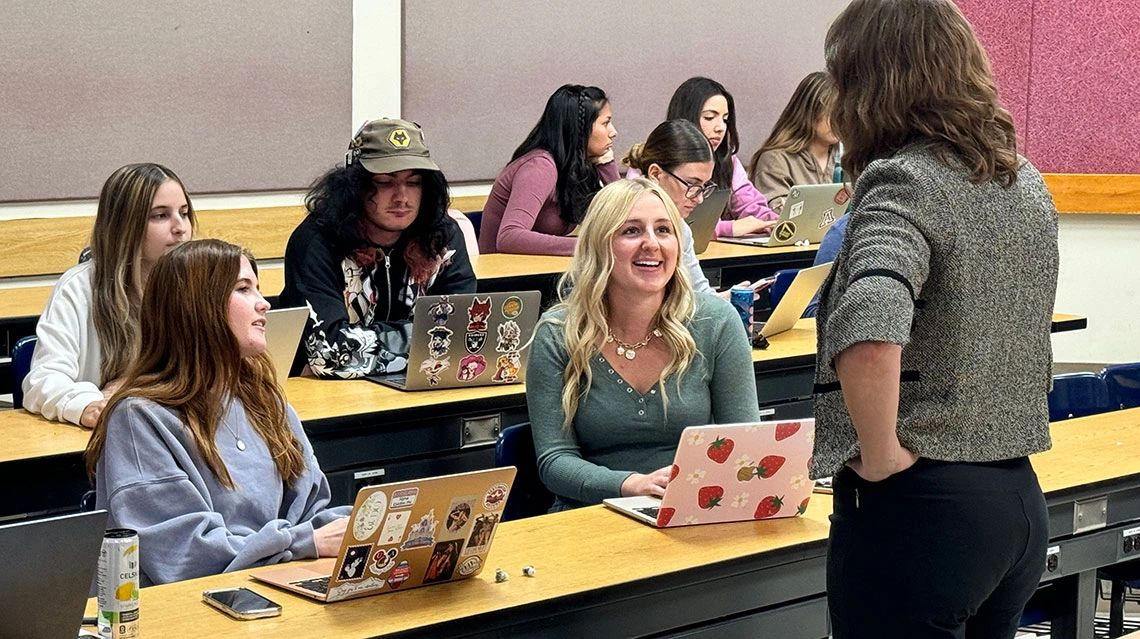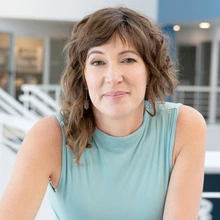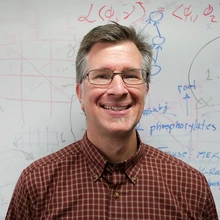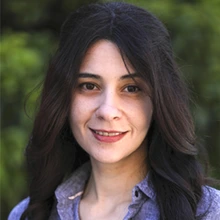Teaching with Purpose, Mentoring with Vision: College of Information Science Faculty Honored

Associate Professor of Practice Diana Daly, recipient of the University of Arizona Foundation Leicester and Kathryn Sherrill Creative Teaching Award, connects with students in the classroom. College of Information Science photo.
This spring, a select group of College of Information Science faculty members has been recognized for something more enduring than a single semester’s work: their dedication to teaching, mentorship and discovery. These award-winning faculty have turned research into mentorship, creativity into curriculum and insight into student success.
An Ecologist’s Classroom of Ideas

For Assistant Professor of Practice Daniel Charbonneau, a behavioral ecologist whose work focuses on the collective intelligence of insect societies, teaching is itself a kind of social experiment. Charbonneau, who won the prestigious University of Arizona Gerald J. Swanson Prize for Teaching Excellence, brings the scientific method into the classroom with both rigor and empathy. His students don’t just learn about decentralized systems—they see themselves as part of one.
“Winning the Gerald J. Swanson Prize for Teaching is an incredible honor,” Charbonneau says. “What makes it even more meaningful is the importance it places on student experiences by soliciting letters of support from students. Reading those letters and the impact I have had on their lives and careers is humbling beyond words.”
With a background in entomology, computer vision and biostatistics, Charbonneau specializes in understanding how groups excel—sometimes in spite of the individuals who comprise them. But in his own classroom—whether in person or virtual—the opposite seems true: it is because of the individual care he offers that students flourish.
A Creative Force for the Digital Age

Down the hall, in classrooms, labs and media centers buzzing with the sounds of collaborative projects and participatory debates, Associate Professor of Practice and Associate Dean for Undergraduate Academic Affairs and Student Success Diana Daly has turned pedagogy into praxis. Daly received the University of Arizona Foundation Leicester and Kathryn Sherrill Creative Teaching Award, a recognition of her groundbreaking work in participatory education.
“This award is such an honor because creative teaching is what I aspire to do—in the classroom and in broader information ecosystems,” Daly says. “To be creative is to connect ideas and form something new out of them, which is precisely what I love to do in collaboration with students.”
From her iVoices Media Lab to the student-coauthored open textbook Humans R Social Media, Daly’s approach is defined by access and empowerment. Her classes don’t just cover content—they give students authorship over the very platforms and narratives they’re studying.
The provost’s letter accompanying the award sums it up well: “Your innovative approach to pedagogy, grounded in student empowerment, has reshaped the way students experience and contribute to the learning process.”
This is Daly’s second significant award this year: in March she was recognized with the OER Architect Award by the OERizona Network.
Mentorship at the Edge of Discovery

If Daly and Charbonneau have shaped the student experience, Associate Professor Clayton Morrison has transformed the landscape for postdoctoral researchers. Winner of the Excellence in Postdoctoral Mentoring Award, Morrison is known not only for his work in artificial intelligence, but for the rare quality of his mentorship—equal parts generous, demanding and enduring.
Morrison’s mentees have gone on to secure major DARPA grants, tenure-track positions and research leadership roles. “Clay is one of the warmest, most genuine people I have ever known,” one former postdoc writes. “His generosity of spirit manifests in his mentoring, and has resulted in outsized impacts on the lives of the students and postdocs he has mentored.”
What makes Morrison’s mentorship distinctive is its breadth. He welcomes scholars from diverse and nontraditional backgrounds—including physicists with no prior training in AI—and helps them find confidence and purpose in unfamiliar terrain. His lab is a place where postdocs don’t just build models—they build futures.
Within the College: A Culture of Excellence
The College of Information Science also honored several outstanding educators and researchers from within its own ranks.

Lila Boz, an assistant professor exploring extended reality and human-computer interaction who co-directs the Extended Reality and Games Lab, received the Teaching Excellence Award for her work bridging real and virtual worlds in service of education, health and wellbeing. She regularly offers the Virtual Reality course in which students design and develop extended reality games.

Meanwhile, Assistant Professor Cristian Román-Palacios, a biologist blending machine learning with climate science, earned the Research Excellence Award for his work on biodiversity and ecological resilience in the face of climate change. Director of the Data Diversity Lab and a member of one of six teams selected as awardees of the inaugural University of Arizona Big Idea Challenge, Román-Palacios’s research has reached far beyond campus—featured in Science News, Popular Science, CNN and more.
The College of Information Science Instructional Excellence Awards went to three educators whose impact in and beyond the classroom speaks for itself: Lecturers Sarah Young and Christine Walsh and Instructor Christopher Forsythe. This recognition reflects excellence in teaching and feedback from students, demonstrating a commitment to learning, innovation and student success that makes a lasting impact across the college.
From the Dean: A Collective Recognition
College of Information Science Interim Dean Catherine Brooks sees in these awards more than individual accomplishments—they are evidence of a faculty culture rooted in care and creativity. “Our faculty are tireless in their commitment to students and scholarship,” she says. “This year’s award recipients reflect the heart of our college—brilliant, collaborative, compassionate educators and researchers who shape knowledge and empower others to do the same.”
In a field defined by information, it is the human connection—between faculty and student, between idea and application—that makes all the difference. The spring faculty awards remind us that great teaching and mentoring aren’t ancillary to academic life at the College of Information Science; they are its most enduring legacy.
Learn more about the transformative research and faculty of the College of Information Science.

